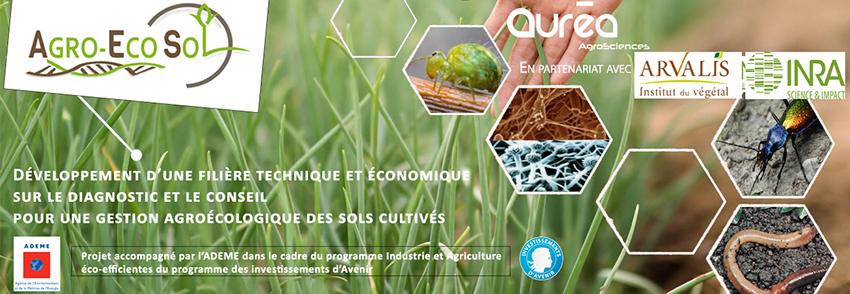Agro-Eco SOL
The Agro-Eco SOL project
CONTEXT :
Moving towards a more eco-efficient form of agriculture will only be possible if the key players who will implement it (farmers, technical advisors, researchers) have the tools to enable them to assess the cropping ability of the soil and to understand the impact of their practices in order to guide agricultural management methods, and that they can do this ‘routinely’, i.e. quickly and at a reasonable cost. However, although we now have, through various methods (soil analysis, diagnosis of the structural state of surfaces, etc.), the relevant tools to assess the physical and chemical state of soil and to therefore predict how it might change under the effects of cropping practices, we are very far from having a level of operational capability such that we can assess the state and biological functioning of cultivated soils (richness, activity and diversity of soil organisms). Including the biological component in diagnostic and advisory tools seems essential in order to be able to assess and manage the variety of benefits we expect from soil (supporting production, carbon storage, limitation of GHG emissions, regulation of pests and diseases, etc.).
AIMS :
The project aims to develop an agro-ecological consulting programme including biological indicators of soil quality. The aim will be to industrialize innovative methods of land analysis in order to provide farmers with comprehensive advice on the management of agricultural soil. The services provided will be both agronomic and environmental.
Project innovations include:
- Industrialization of biological indicators: optimisation of the entire analytical process in order to increase processing capacity, lower the cost price and reduce testing times (standardised sampling protocols, optimised and industrialized operating procedures thanks to the use of automated systems).
- The development of operational consulting based on these biological indicators: creation of interpretation guidelines (effect of the pedoclimate and cultural practices), definition of desirable levels of functions / services informed by these biological indicators as well as possible triggers to reach these levels, development of consulting algorithms and production of training / communication supports.
- Accessibility of the service: digital collection of information and consultation of the results and automation of the consulting process.
PROJECT INDICATORS
In addition to physico-chemical soil analysis and field observations (spade test, etc.), the indicators selected relate to various components of the biological quality of soils:
- Functions related to the carbon and nitrogen cycles
- Enzyme activities
- Abundance and diversity of micro-organisms (bacteria and fungi)
- Abundance and diversity of soil fauna (earthworms, ground beetles, mites, springtails, nematodes)
Liste complète des indicateurs
SOCIAL AND ENVIRONMENTAL IMPACTS
The programme provided by AGRO-ECO SOL will create value for all key players in the arable, mixed arable and livestock farming sector:
- farmers: contribution to the sustainability of farming practices by optimising soil management, which not only increases soil productivity and the sustainability of its practices, but also leads to the better use of organic and synthetic fertilizers
- agricultural distribution and advisory organisations: access to innovative advisory and differentiating tools, creating value
- laboratories: in a position to offer innovative and profitable testing, new growth drivers for new market shares
- technical institutes and research organisations: integration of these new tools and approaches in their research and development work for and on agroecology.
ENVIRONMENT
The agro-ecological advice resulting from AGRO-ECO SOL will improve the eco-efficiency of agriculture and help it meet the many challenges facing it:
- contribute to food security and the production of biomaterials through an invaluable increase in the productivity of cropping practices.
- Maintain or even improve the fertility of the environment and the potential of the soil.
- Improve the profitability and competitiveness of the field crop and livestock farming sector
- Reduce its negative environmental effects on air quality (greenhouse gas emissions), water quality (eutrophication linked to nitrates and phosphates, transfer of phytosanitary residues), soil quality (loss of topsoil through erosion), biodiversity and the quality of natural environments in general.
The AGRO-ECO SOL project is supported by ADEME under the eco-efficient Industry and Agriculture programme from the Investments for the Future initiative. The total cost of the project will be €5.4 m over 4 years. It is subsidised to the tune of €2 m in the form of subsidies and repayable advances.




